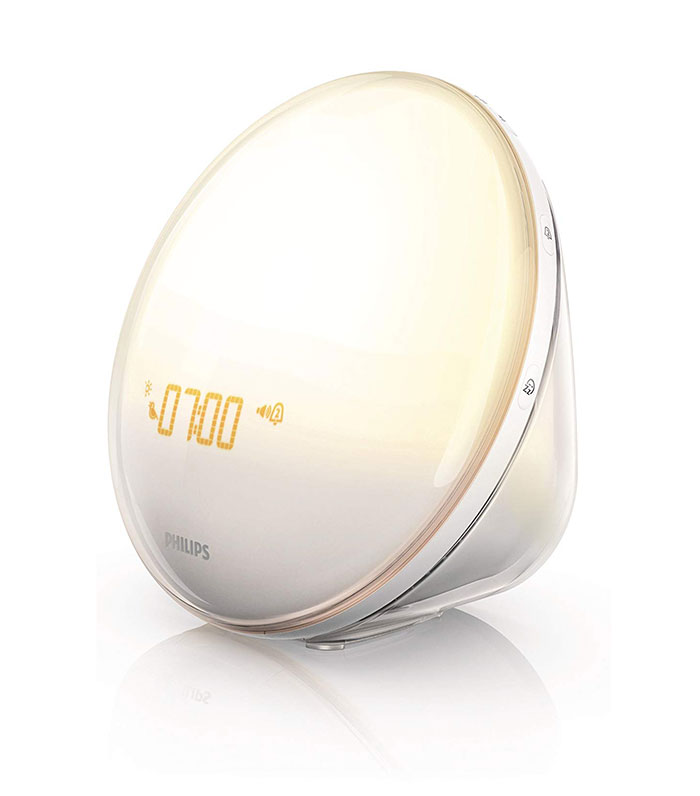The One-Minute Trick That Makes Getting Up in the Morning Easier
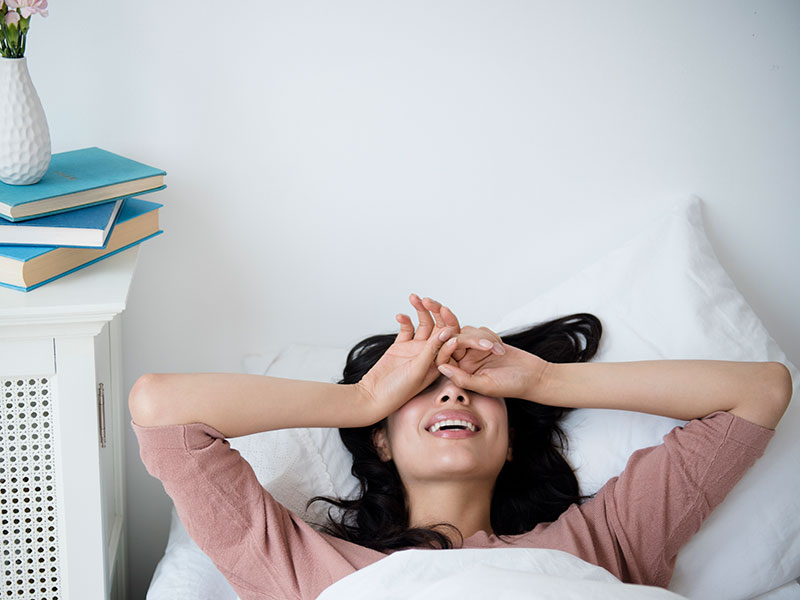
This scenario might sound familiar to you: The alarm goes off, but leaving the comfort and warmth of your bed seems unfathomable. You hit the snooze button and burrow deeper into your blankets. After a few more snooze-button hits, you realize you only have 20 minutes to get ready for work. Then you find yourself rushing to brush your teeth, do your makeup, get dressed, grab some breakfast (or not), and run out the door. Congrats—you just ran a short sprint before the workday has even begun.
So yeah, sometimes waking up can be so hard, even if you consider yourself a morning person. But the thing is that the way you wake up can dictate the outcome of your day. If you start the morning grumpy, that irritability might carry on throughout the day. How can you wake up with a little pep in your step (or at least have the willpower to get out of bed)? We asked sleep experts for their best advice. And good news: The first trick will only take you one minute at least and requires very minimal effort.
Tip #1: Give Yourself a Pep Talk
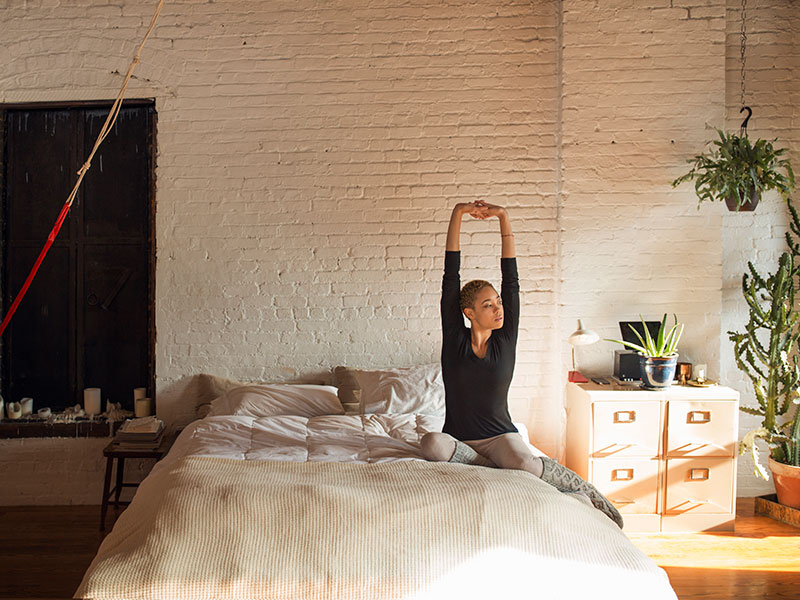
This will only take you a minute, but a little bit of mindfulness will help jumpstart your day. "I make a point of telling my patients you need a reason to get up in the morning," says Rafael Pelayo, MD, clinical professor of psychiatry and behavioral sciences at the Stanford Center for Sleep Sciences and Medicine. "Waking up is one thing; getting out of bed is different. So you have to think a little bit about that: Why are you waking up? Your brain wakes you up; it's volitional to get out of bed. Just think about your reason to get out of bed."
You know that viral YouTube video "Jessica's Daily Affirmation" that put a smile on your face back in 2009? Well, there's a reason it made you happy—it was a refreshing burst of positivity. A little bit of that first thing in the morning can help. So even if you're dreading that meeting with your boss when you get into the office or that dentist appointment in the afternoon, there has to be something you're excited about. It can be as big as finally booking a flight for an international trip or as small as listening to your favorite podcast on your commute.
Tip #2: Beware of the Snooze Button
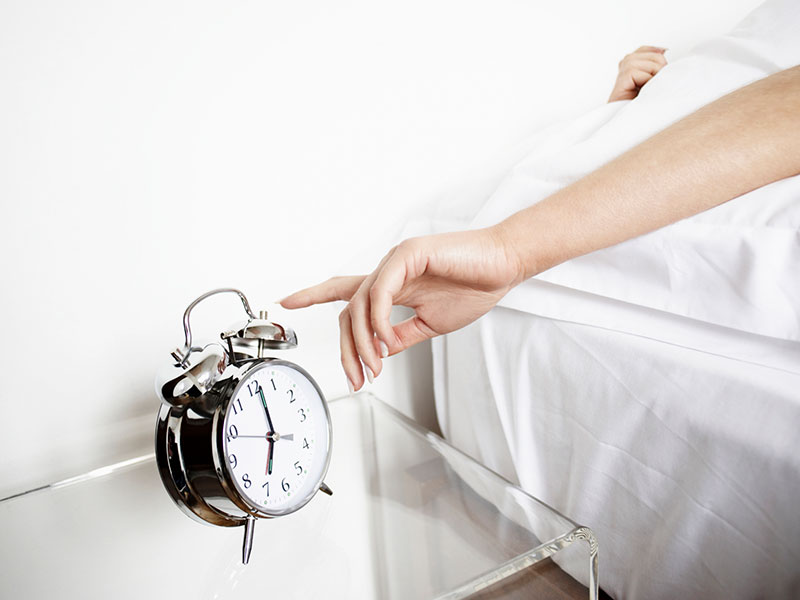
The snooze button might seem like your friend, but it's not. "The snooze button has got to be out of arm's distance," says Rajkumar Dasgupta, MD, assistant professor of clinical medicine at USC's Keck School of Medicine. The reason? You might think you're getting more sleep, but you might wake up even groggier—and that all comes down to the stage of sleep you're in when your alarm blares.
"When you go to bed, you're in non-REM sleep; you go through non-REM stage one, then two, then three; then finally you hit REM," says Dasgupta. "If you wake up in the lighter stages like N1 or N2, you'll feel a little bit more refreshed. Some little gadgets and alarm clocks try to make you wake up in the lighter stages of sleep. If you wake up in the deeper stages, like REM sleep—that's the sleep where you get these very vivid dreams—you get a little groggy.
"So maybe you woke up kind of refreshed, maybe you got N1 or N2, and then you hit the snooze button… It's kind of like a box of chocolates: You never know what you're going to get. So if you get REM, now you're going to be sleepy."
Something to watch out for: Your reliance on the snooze button may signal a problem. "It may be a bandage of an underlying sleep disorder," Dasgupta says. "If you got your seven to eight hours of sleep as an adult, you should be refreshed, but if you need more and more sleep, it may be that you're not getting that refreshing sleep at night. Sleep is always about the two Q's: the quantity of sleep and the quality of sleep."
Tip #3: Let There Be Light
Opening your blinds might be a little jarring to your eyes at first, but it will help you feel energized. "In the morning, another rule is being exposed to light. At night time, you want to have a blue-light shade so you can get the melatonin going, but the morning is the opposite," says Dasgupta. "You want to let that sunshine in. We can't always have sunshine—it's not always spring and summer—so there are some individuals who may use a light box to kind of mimic the sunlight."
Tip #4: Do Something You Enjoy in the Morning

Doing an activity that makes you happy early on in the morning will help put you in a good mood for the rest of the day. "I tell my patients to do something in the morning that they enjoy if they can," Pelayo says. "[Maybe] you like to exercise, or there are people who like to paint in the morning or read a little bit, or spend time alone with their thoughts in the morning."
Tip #5: Exercise
As Elle Woods (aka Reese Witherspoon) said in Legally Blonde, "Exercise gives you endorphins. Endorphins make you happy!" You might be sleepy when you're heading to the gym or workout class, but chances are you'll feel energized afterward. And if it's nice out, Dasgupta advises to get outside for your workout. "If you're fortunate to live somewhere like California, not only do you get the sunlight, but you can actually exercise outdoors. So if you can combine the two, I think that's a great thing to get the adrenaline going in the morning."
Tip #6: Eat Well

Stay away from the heavy stuff in the morning; instead, eat something that will give you a lot of energy. "Eating the Denny's lumberjack special is not the way to go," Dasgupta says. "Eat smart; eat a lighter meal. Breakfast, cliché as it is, is the most important meal of the day, so it's not the quantity of what you eat, but what you eat."
Tip #7: Set Your Bedtime
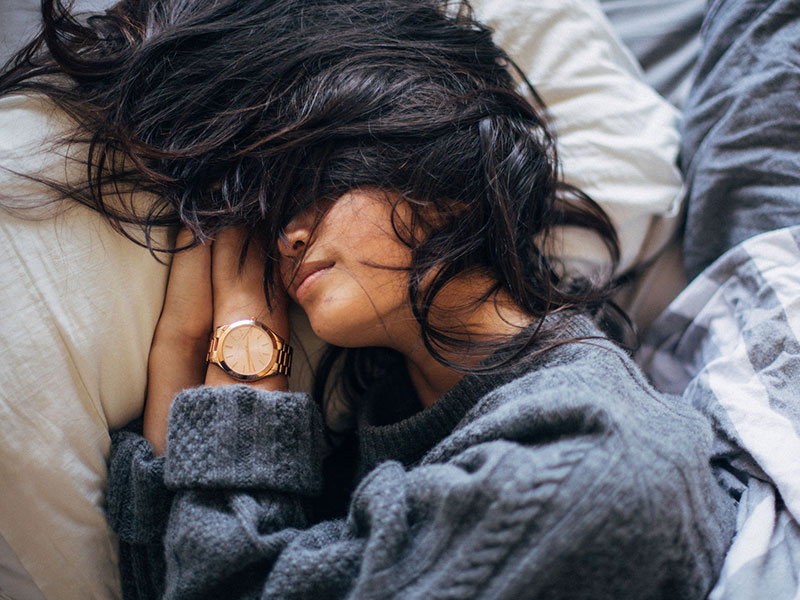
Part of being able to wake up easier in the morning is starting with good habits the night before. "The key is sleep restriction, meaning having a set bedtime and set waking time all the time—this includes weekends and holidays," Dasgupta says. "When it's Friday night, try not to stay out late; you don't want to sleep in late on Saturday… Because what does it do? It throws off your whole Sunday night schedule, and you're going to start your Monday feeling sleep-deprived."
Tip #8: Limit Nighttime Eating and Drinking

"Watch what you eat at night, because heartburn can cause a lot of awakening," Dasgupta recommends. "I know many people love a nightcap, many people love a glass of wine… If you want to sleep faster, that's what alcohol would do, but the downside is always going to be multiple awakenings throughout the night [and] groggy morning awakenings. Not just because of the alcohol, but it also causes you to have many trips to the bathroom at night. Alcohol screws with your blood sugar, making you hungry in the morning, and the next thing you know, you're going to get that heavy breakfast you eat after a night of drinking."
Put these ideas into practice and you might see your mornings improve.
Next: How to Fall Asleep in 5 Minutes Flat
Disclaimer
This article is provided for informational purposes only and is not intended to be used in the place of advice of your physician or other medical professionals. You should always consult with your doctor or healthcare provider first with any health-related questions.
Sarah is lifestyle writer and editor with over 10 years of experience covering health and wellness, interior design, food, beauty, and tech. Born and raised in Los Angeles, she attended New York University and lived in New York for 12 years before returning to L.A. in 2019. In addition to her work at Who What Wear, she held editor roles at Apartment Therapy, Real Simple, House Beautiful, Elle Decor, and The Bump (sister site of The Knot). She has a passion for health and wellness, but she especially loves writing about mental health. Her self-care routine consists of five things: a good workout, “me” time on the regular, an intriguing book/podcast/playlist to unwind after a long day, naps, and decorating her home.

